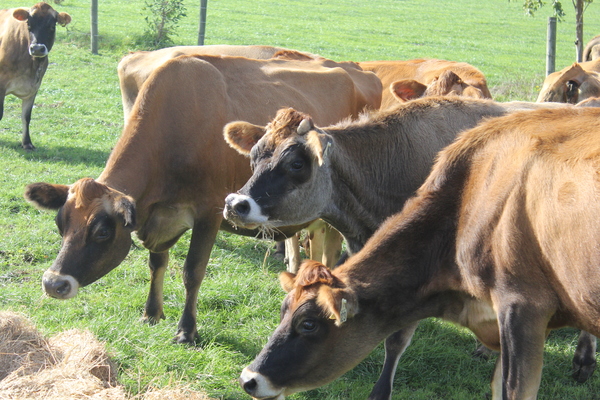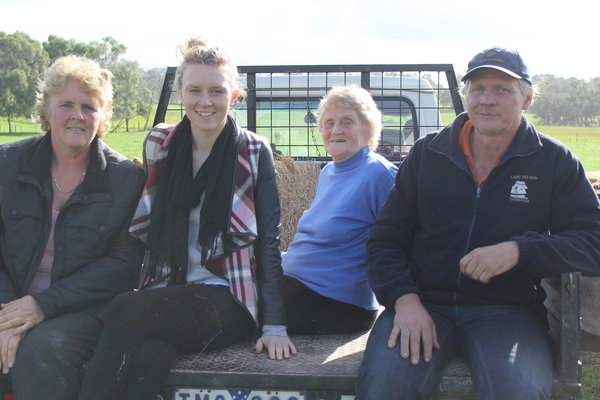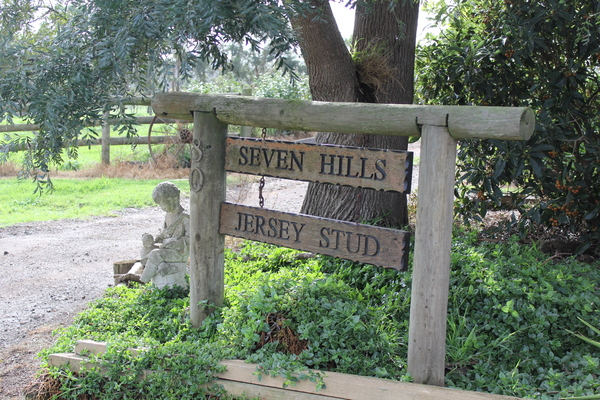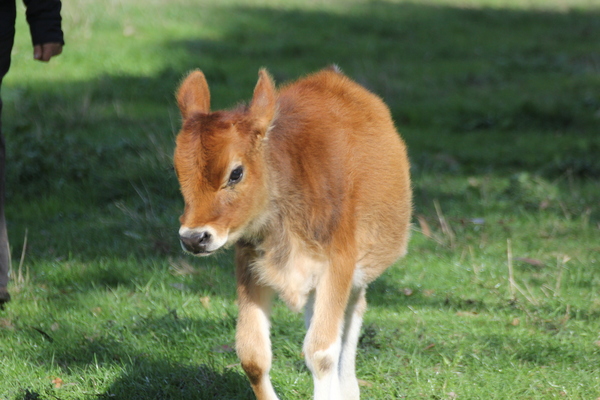A text message. That’s how Nar Nar Goon North’s Ritchie family found out their future in dairy farming had been put into serious jeopardy. Siblings Colin and Joanne, and their mum Faye sat down with RUSSELL BENNETT to explain how the recent announcements by Murray Goulburn and Fonterra have turned their world upside down.
EXCEPT for a one-year transition period from one generation of the family to the next, the Ritchie name has been involved in dairy farming for 150 years.
They’ve traced back their family name to discover that five generations have farmed at properties in either Pakenham or Nar Nar Goon, but now – due to what’s quickly become known as simply the ‘dairy crisis’ – there probably won’t be a sixth to follow in their footsteps.
To produce a kilogram of milk solids costs dairy farmers just over $5, and they were paid $5.60 for it. For every litre of their milk bought in the supermarket, it costs farmers 38 cents to make and they were paid 42 cents … until around three weeks ago when Murray Goulburn, and Fonterra – the world’s biggest dairy exporter – both slashed the prices they paid them.
Instead of $5.60, that price is now around $5 – meaning it costs farmers more to produce a litre of milk than they’re actually paid.
And what makes the situation even more critical for farmers like Fay, Joanne and Colin Ritchie is that these cuts are retrospective to the start of the 2015-’16 financial year. Now, many dairy farmers are forced to have to pay Murray Goulburn and Fonterra back.
“(Getting out) ends up being a big decision because it takes away your hobby, your livelihood, your identity as a family – everything.”
The main cause of the slashed price is a reduction of demand in China, leading to a stockpile of supplies and the drop in value of milk.
In a statement on the Fonterra website, managing director of Fonterra Oceania Judith Swales said the price change reflected ‘the reality of the supply and demand imbalance that is affecting global dairy commodity prices, compounded by the recent strength of the Australian dollar’.
“The reduction in the farmgate milk price is the last thing farmers want to hear,” she said.
“However, it is unlikely to come as a surprise.
“With around 40 per cent of Australia’s milk exported, our ongoing message has been that Australia is not immune to the global dairy challenges, that the milk price did not reflect current reality and that farmers need to budget conservatively.”
Only, to the Ritchies this did all come as a surprise, and they were only alerted to the change by a text message that read: “Fonterra revises price from $5.60 kg/MS to $5.00 kg/MS and introduces loan up to $0.60c kg/MS. Visit Dairyweb or call 1800 266 674”.
That’s it.
“Financially, we’re doing better than most,” said a stoic Colin, sitting at the dinner table with Faye and Joanne.
“We’ve got no debt but we need to make a living, which you’re not going to do in this situation.
“Our only option is to try and cut down our inputs, so we’ll basically halve the number of cows we’ve got, reduce the amount of grain we buy in and try and take the cheaper feed sources which is your pasture and utilise that better, and go off farm and get a job.”
Colin and Joanne took over the running of their Nar Nar Goon North farm, Seven Hills, in 1989. The property is just under 500 acres, with a milking area of about 240.
But Colin has now been forced to take on off-farm work and they’re starting to sell some of their Jersey herd.
“In 1997 I went back to work during the drought,” Colin said.
“At that stage we had debt and younger kids, so we really needed money.
“As you get older the kids aren’t that much of a drain anymore and so you can get away with less, but you still need some income coming in. You can’t afford to be doing it for nothing, and that would be what the outcome is.
“They won’t tell you what next year’s price is going to be because – let’s face it – they’ve got no idea. So, you can only work on $5 or less and that’s below production cost.”
Now, Colin says Fonterra is likely “gone” in Australia.
“Murray Goulburn – I’m not as bitter at them because I don’t supply them – but at least if someone comes in and takes over that company, it’s a new entity,” Colin said. “Fonterra is still going to be Fonterra, and the way they’ve acted is not going to change.”
Colin questioned why dairy share farmers would even continue doing it next year.
“The poor guy who owns the farm – some 80-year-old who’s just put a share-farmer on – is then suddenly left with an asset that he can’t find anyone to run,” he said.
Even as owner-operators, the Ritchies are questioning their position in the industry.
“If you’re in a reasonable position and you’re reasonably young then you’ll push through,” Colin said.
“We’ve done that before – we’ve done it in the mid-‘90s during the drought and at other times when prices were low.
“The middle-aged people will probably consider pushing through it but it’s the new farmers – they’ll probably go broke – and it’s the old who’ll just say they’ve had enough. None of my kids are interested in it so we’re more being led to wondering if this is as good a time as any to get out.”
Colin estimates a turn-around in milk price may not happen for another 18 months. By then, for the Ritchies, it could be too late.
“I would think this is the beginning of the end for us in dairying,” he said.
“Any thoughts of expanding or anything like that are well and truly gone. Now it’s about contracting and we’ll keep contracting to the point where, even when the prices come good, it won’t be economically viable.
“Next year if the prices open where they currently are at $5 then absolutely everyone will make a loss.
“The year after that I can’t see a turnaround where it jumps to $6.50 or $7 to make up for those two years.”
The Ritchies are now down to about 200 milkers. They would have milked 300 if the price drop had not come into effect.
“If they’re no longer good to us as a dairy cow they’ll have to go,” Colin said.
“(Getting out) ends up being a big decision because it takes away your hobby, your livelihood, your identity as a family – everything.
“I can’t see us expanding. We’ll end up stepping down towards the exit, really.”
Colin said Joanne was more emotional than him when it comes to their herd, adding: “if the cows weren’t involved, we’d be out tomorrow”.
Joanne said they’re more to them than just a number.
“Especially when you breed them from when they’re a day old,” she said.
“They’re both your babies and your workmates.”
In the statement on the Fonterra website, Ms Swales said the company was ‘firmly committed to supporting farmers, despite the obvious business challenges the milk price reduction would cause’.
“We have the right strategy and we are delivering on a clear, sustainable plan,” she said.
“Work is underway to rebuild our Stanhope cheese plant with 50 per cent extra capacity and we are growing our nutritionals business with Bellamy’s and Beingmate.
“Our priority is ensuring a long-term sustainable business for Fonterra and for our farmers that supply us.”
The Dairy Australia website has begun to roll out a series of ‘Tactics for Tight Times’ fact sheets, which it says are designed to ‘assist dairy farmers to assess their situation and plan the way ahead during the current uncertainty around seasonal conditions and milk pricing’.
For more information, visit www.dairyaustralia.com.au.











